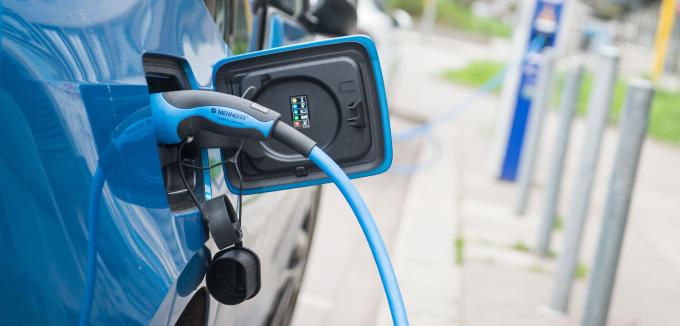DPA
Sales of e-cars are still slow to get going: more acceptance is lacking at charging stations, politics and the auto industry are convinced
It is a declaration of intent, nothing more: the car industry and politics want to help the electric car in Germany to a breakthrough. As a central requirement, they have identified a dense network of charging stations. Now is a “master plan” ago.
The German government and the automotive industry want to further promote the expansion of the charging network for electric vehicles in Germany. It has agreed to develop a “master plan” for it, said the President of the Association of the Automotive Industry (VDA), Bernhard Mattes, after a meeting of industry representatives and the leaders of the coalition on late Monday evening in the Chancellery. Industry, trade unions and politics have “laid a good foundation stone” for sensible measures to achieve the climate protection goals.
The plan should clarify everything necessary to expand the network of charging stations so that by 2030 seven to ten and a half million electric vehicles could be on the road. Loading points are one of the key points for customer acceptance, said Mattes. There was no talk of financial commitments and subsidies. The results achieved for a master plan should be discussed at a next meeting. Then decisions should follow.
At the well three-hour meeting with Chancellor Angela Merkel (CDU), among others, VW boss Herbert Diess and BMW chief Harald Krüger participated. Also Minister of Economics Peter Altmaier (CDU), Environment Minister Svenja Schulze (SPD) and Finance Minister Olaf Scholz (SPD) joined.
Minister of Transport Andreas Scheuer (CSU) said before the prelude, in order to maintain the prosperity and to meet the climate goals, Germany must “become world champion in several disciplines”. This applies to e-mobility, hydrogen propulsion and alternative fuels.
“The biggest lever for climate protection goals is electromobility”
VDA President Mattes said after the conversation, in view of the climate protection goals 2030 one must concentrate strongly on the “largest lever”, and that is the electric mobility “. In the long term, however, “additional alternatives would have to be added that make sense for other applications”. He dismissed concerns that this was a one-sided fixation on e-mobility.
Sales of e-cars are still slow to pick up – despite incentives such as a purchase premium that has just been extended to 2020. According to figures from the Federal Motor Transport Authority (KBA), the number of electric cars was 83,000 as of January 1, 2019, and that of hybrid cars was 341,000, with a total of 47.1 million cars.
The black-red coalition had announced regular summit meetings in March to make the car industry with more than 800,000 employees fit for the future. The aim of a “Concerted Action Mobility” should be to determine the need for political action. Background are profound changes to new drives such as batteries, hydrogen or synthetic fuels. At the same time, computer-controlled vehicles are increasingly coming into view. This also has consequences for the world of work and the employment situation.
rei / dpa

